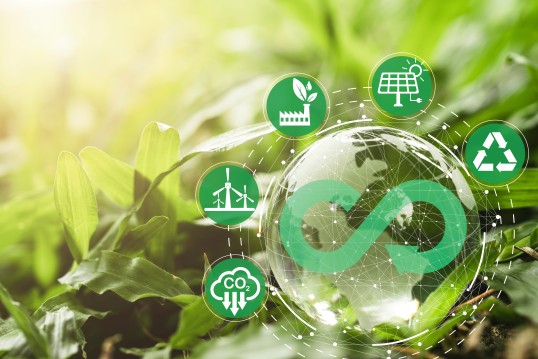- Artificial Intelligence (AI)
- Occupational exposure limit values
- Climate Change and Occupational Safety
- List of CMR substances
- Ergonomics
- EU GHS Regulation
- Industrial Security
- Collaborative robots
- Noise
- Nanoparticles at the workplace
- REACH
- Reference materials
- Proficiency testing
- Radiation
- Vibration
- Virtual reality
- Work 4.0
Circular economy

Source: Dilok - stock.adobe.com
Background
Effective decarbonization requires certain raw materials, especially lithium, to be available in sufficient quantities. To ensure the continued supply of these scarce resources and, at the same time, responsible action at a global level, a European recycling infrastructure for electric batteries and electronic waste and for end-of-life wind turbine rotor blades must be established. This would also create a new, forward-looking industry in Germany. The risks and hazards of this industry must be anticipated, researched and assessed. This gives occupational safety and health the opportunity to play a part in shaping future working conditions from the outset.
Work of the KKA at the IFA
The IFA has already addressed work-related hazards and protective measures during recycling in the past, for example with regard to mercury exposure during the recycling of lamps. In addition, the German Social Accident Insurance Institutions’ MGU measurement system at the IFA has been recording and documenting exposure to the most diverse of hazardous substances for over 50 years. The data pool available as a result can also be used to assess recycling activities. A past example is exposure to carbon fibres and carbon fibre composite materials arising during the recycling of rotor blades.
Contact

Competence Centre for Climate Change and Occupational Safety and Health at the IFA
Email: kka@dguv.de
Contact:
Angelika Hauke
Tel.: +49 30 13001-3633
